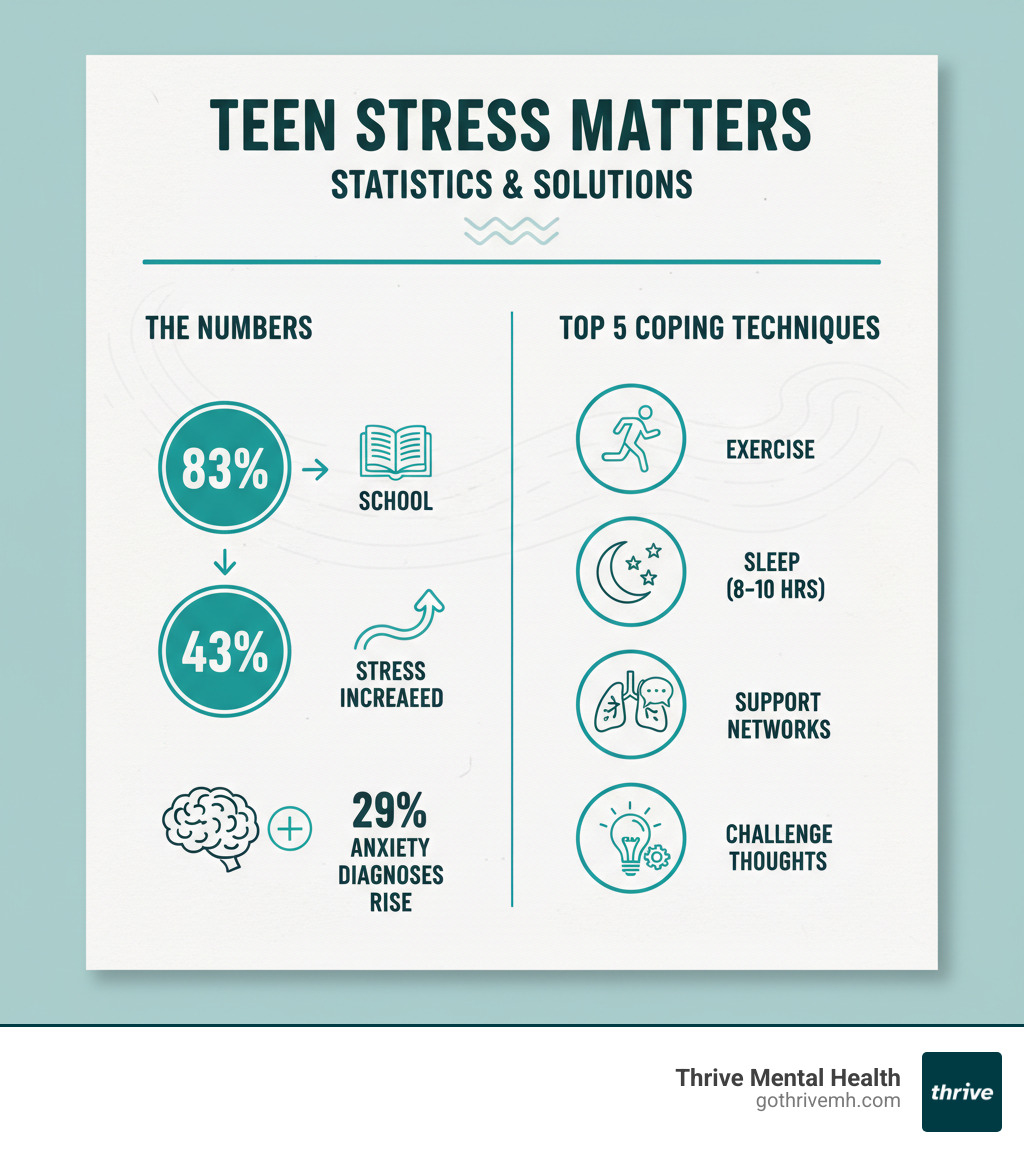How Teens Can Manage Stress Without Losing Their Minds

Stress Management for Teens: 10 Proven Ways to Stay Calm
Why Teen Stress Levels Are at an All-Time High
Stress management for teens has become more critical than ever. The numbers are stark: between 2016 and 2020, anxiety diagnoses in children aged 3-17 grew by 29%, while depression increased by 27%. About 43% of teens say their stress levels have gone up, and 45% struggle to concentrate on schoolwork.
The biggest stressors? School tops the list at 83%, followed by college anxiety (69%) and family financial worries (65%). But here’s what many adults miss: teen stress isn’t just about “not having real responsibilities.” Your developing brain processes stress differently, making everyday pressures feel genuinely overwhelming.
The good news? Stress management skills learned during adolescence build the foundation for lifelong emotional intelligence and resilience. You’re not broken if you’re struggling—you’re human, and you’re learning to steer a genuinely stressful time.
I’m Anna Green, LMHC, LPC, and as Chief Clinical Officer at Thrive Mental Health, I’ve seen how the right tools can transform overwhelming stress into manageable challenges.

Quick stress management for teens definitions:
Understanding the “Why”: Your Brain on Stress
Being a teenager today can feel like juggling endless school demands, future-defining college applications, relentless peer pressure, and impossible family expectations. Add in body changes and family financial stress, and it’s no wonder you feel overwhelmed. Your stress is real, common, and makes complete sense.
But not all stress is your enemy. “Good stress” (eustress) is the energizing feeling before a big game or a test you care about. It motivates you and disappears afterward. The problem is “bad stress” (distress)—the persistent, draining feeling that can harm your health if it sticks around.
When stress hits, your body enters fight-flight-freeze mode, flooding you with hormones like cortisol. Your heart pounds and muscles tense—great for escaping danger, but not for writing an essay. Your teenage brain is still developing its stress-management controls, so these hormones can linger, leaving you anxious, irritable, and unable to focus. Chronic stress can lead to sleep problems, digestive issues, headaches, and increase your risk for anxiety and depression. Your body is literally wearing itself out. The science behind the stress response shows this is a powerful reaction.
What are the signs of too much stress?
Look for these warning signs that stress management for teens needs to become a priority:
- Emotional/Behavioral: Constant irritability, snapping at people, withdrawing from friends and activities you used to enjoy.
- Physical: Frequent headaches or stomachaches without a medical cause, sleep problems (too much or too little), and changes in eating habits.
- Academic/Cognitive: A drop in grades, difficulty concentrating, forgetfulness, and neglecting responsibilities.
If you’re using substances or the internet to escape, or have persistent feelings of sadness, it’s time to seek support.
Differentiating a “Real Tiger” from a “Paper Tiger”
Your brain’s alarm system was built for physical threats (“real tigers”), but modern life triggers it with “paper tigers”—an upcoming exam, a friend conflict, or a rejection letter. These situations feel dangerous but aren’t.
The key is to pause and assess. Is this a real danger, or a challenge that needs problem-solving? Recognizing a “paper tiger” allows you to activate your body’s relaxation response, slowing your heart rate and clearing your mind. This skill is at the heart of effective stress management for teens, helping you feel more in control.
10 Proven Stress Management Techniques for Teens That Actually Work
Stress management for teens isn’t about eliminating stress; it’s about building a toolkit of strategies that work. Consistency is key: a five-minute daily practice is better than a one-hour session you only do once. Let’s explore ten evidence-based strategies.
1. Master Your Breath, Master Your Mind
Your breath is your most portable stress-relief tool. When stressed, you breathe shallowly. You can reverse this with diaphragmatic breathing (belly breathing). Place one hand on your belly and breathe in slowly through your nose, letting your belly rise. Exhale slowly. This simple act lowers your heart rate and tells your brain you’re safe.
Pair this with mindfulness, which is simply noticing the present moment without judgment. Try the 5-4-3-2-1 grounding technique: name 5 things you see, 4 you hear, 3 you feel, 2 you smell, and 1 you taste. It pulls you out of a stress spiral. Research on mindfulness for teens shows it significantly reduces distress.

2. Move Your Body to Clear Your Head
Exercise is a powerful tool for stress management for teens. It burns off stress hormones like cortisol and releases endorphins, your brain’s natural mood elevators. Aim for sixty minutes of daily activity. This doesn’t have to be a grueling workout—dancing, walking the dog, or playing basketball all count. Aerobic exercise like running or swimming is especially effective. Getting outdoors amplifies the benefits. Even a brisk 10-minute walk can shift your mood. The power of exercise for mental health is well-documented.
3. Fuel Your Brain and Body
What you eat directly affects how you handle stress. A sugar rush leads to a crash, making stress feel worse. Focus on regular, nutritious meals with fruits, vegetables, whole grains, and lean proteins for sustained energy. Be mindful of caffeine, as too much can increase anxiety and disrupt sleep. And don’t forget hydration; even mild dehydration can impact your mood and concentration. For guidance, check out ChooseMyPlate.gov.
4. Prioritize Sleep (Seriously)
Sleep is when your brain processes emotions. Without it, your emotional regulation is on empty. Teens need 8-10 hours of sleep, but most get far less. Good sleep hygiene is crucial. Go to bed and wake up around the same time daily, even on weekends. Put away screens at least an hour before bed, as the blue light disrupts sleep. Make your bedroom a cool, dark, quiet sleep sanctuary. Better sleep means better stress management.
5. Challenge Your Negative Self-Talk
Your inner critic (“I’m going to fail”) creates stress. Cognitive Behavioral Therapy (CBT) techniques teach you to catch and challenge these thoughts. Instead of “I’m going to fail,” reframe it: “This is challenging, but I’m preparing and doing my best.” Watch for cognitive distortions like all-or-nothing thinking (“If I don’t get an A, I’m a failure”). Most importantly, practice self-compassion: talk to yourself like you would a good friend. Learn more about CBT for Stress Management.
6. Get Organized and Stop Procrastinating
Procrastination is a major source of anxiety. Make tasks feel manageable by breaking them into smaller pieces. Instead of “write history paper,” your first step is “choose topic.” Use a planner or app to track deadlines—checking things off feels great and frees up mental energy. Set small, achievable goals to build momentum. The relief of being prepared is one of the best stress-busters.
7. Build Your Support Squad
Handling stress alone is unnecessarily hard. Strong social support is a huge protective factor. Talk to trusted friends, family, or counselors. Just saying your worries out loud can make them feel smaller. Choose your network wisely—surround yourself with people who lift you up. And don’t be afraid to ask for help. It’s a sign of strength, not weakness.

8. Unplug and Set Digital Boundaries
Social media can be a major stressor due to constant comparison, FOMO, and negative content. Research shows it’s not an effective coping tool. Setting digital boundaries is essential for modern stress management for teens. Use screen time limits, create screen-free zones (like your bedroom at night), and curate your feed to be positive and inspiring. Unfollow accounts that make you feel bad. A digital detox, even for a few hours, can be incredibly refreshing.
9. Find Your Creative or Fun Outlet
Sometimes the best stress relief is a complete break. Creative and fun activities are “instant vacations” for your mind. Creative expression—drawing, writing, playing music—helps process emotions. You don’t have to be “good” at it; the process is what matters. Hobbies like gaming, reading, or spending time with pets also provide relief. Find what brings you joy. For ideas, explore Art Therapy Directives for Teens or other Therapeutic Activities for Teens.
10. Learn to Say “No”
Over-scheduling is a fast track to burnout. Many teens feel pressured to say yes to everything. Setting healthy boundaries is essential for protecting your energy and well-being. It’s not selfish. Practice assertiveness: “I can’t take on anything else right now, but thank you for thinking of me.” Saying no to some things means saying yes to downtime, sleep, and hobbies—all necessities for managing stress.
When Stress Becomes Too Much: Knowing When to Get Help
Sometimes, even with a great toolkit, stress becomes overwhelming. This isn’t a failure; it’s a signal you need more support. If stress symptoms persist for weeks or significantly impact your schoolwork, relationships, or sleep, it’s time to get professional help.
Crisis Support: If you are having thoughts of harming yourself, please call or text 988 immediately. Help is available 24/7.
Recognizing you need help is a sign of maturity. Thoughts of self-harm or suicide require immediate attention and should never be handled alone.
Talking to a Professional
Seeking therapy is a smart, strong move for your mental health—just like seeing a doctor for a broken leg. Therapy is a confidential space to work through feelings without judgment. A good therapist provides personalized stress management for teens strategies and helps you build confidence.
Your school counselor is a great first step. For teens who feel anxious about in-person meetings, Virtual Counseling for Teens is a flexible, accessible option.
How Parents Can Support Teen Stress Management
Parents and caregivers are crucial allies. Your support can make all the difference.
- Communicate Openly: Create a judgment-free zone for your teen to share their worries. Practice active listening—put your phone down and truly hear them.
- Validate Their Feelings: Their stress is real to them, even if it seems small to you. Instead of “don’t worry,” try “I can see this is really stressing you out.”
- Model Healthy Coping: Show your teen how you manage your own stress in healthy ways.
- Avoid Judgment: Comments like “when I was your age” shut down communication. Work together as a team.
- Monitor for Warning Signs: If you notice persistent changes in mood or behavior, trust your instincts and consult a professional. Early intervention is key.

Insurance and Access to Care in Florida
Navigating insurance for mental health care can be overwhelming. At Thrive Mental Health, we aim to make stress management for teens programs as accessible as possible.
We work directly with major insurance providers, including Cigna, Optum, Aetna, and Florida Blue, among many others. Our team can help you understand your specific coverage without confusing jargon.
For families in Florida, we offer flexible intensive outpatient (IOP) and partial hospitalization (PHP) programs designed around a teen’s schedule, including evening program options. Our virtual programs mean you can access expert-led care from anywhere in the state, whether you’re in Miami, Orlando, or a smaller town.
Don’t let cost concerns be a barrier. Our benefits verification process is quick and comes with no obligation. We’re committed to finding a path that works for your family.
Frequently Asked Questions about Stress Management for Teens
Parents and teens often have the same questions about stress management for teens. Here are the most common ones.
What are the 5 best ways for a teen to manage stress?
The five most effective, evidence-based strategies are:
- Regular exercise: To burn off stress hormones and boost mood.
- Quality sleep: 8-10 hours a night is essential for emotional processing.
- Mindfulness/Deep Breathing: An immediate tool to calm the nervous system.
- Social Support: Connecting with trusted friends and family reminds you you’re not alone.
- Challenging Negative Thoughts: Reframing unhelpful thoughts into more realistic, manageable ones.
These five strategies work together to build a strong foundation for resilience.
What is the biggest cause of stress for teens?
Research from the APA consistently shows school is the #1 stressor for 83% of teens. This is followed by worries about life after high school (69%) and family financial concerns (65%). These are not “teenage drama” but significant life pressures that require real coping skills.
How do I know if my teen is too stressed?
Look for significant and persistent changes from their normal behavior. Key warning signs include constant irritability or anger, withdrawing from friends and hobbies, a noticeable drop in grades, frequent physical complaints like headaches or stomachaches, and major shifts in sleeping or eating habits. If you feel something is “off” for more than a couple of weeks, it’s time to talk or seek professional guidance.
Take the Next Step Toward Feeling Better
As you finish this article, remember this: stress is manageable. The pressures on teens today are real, and your feelings are valid. But you are not powerless.
We’ve covered why stress happens and walked through 10 proven stress management for teens techniques—from breathing exercises to setting boundaries. These are evidence-based skills that build lifelong resilience. Some days will be easier than others, and that’s okay. What matters is that you keep practicing and building your emotional toolkit.
Most importantly, you don’t have to do this alone. Reaching out for support—to a friend, counselor, or mental health professional—is a sign of strength. At Thrive Mental Health, we help teens transform overwhelming stress into manageable challenges every day. Your stress doesn’t define you. Your resilience does.
Ready for support? Thrive offers virtual and hybrid IOP/PHP with evening options. Verify your insurance in 2 minutes (no obligation) → Start benefits check or call 561-203-6085. If you’re in crisis, call/text 988.
{
"@context": "https://schema.org",
"@type": "FAQPage",
"mainEntity": [{
"@type": "Question",
"name": "What are the 5 best ways for a teen to manage stress?",
"acceptedAnswer": {
"@type": "Answer",
"text": "The 5 best strategies are often cited as: 1. Regular exercise, 2. Getting enough quality sleep, 3. Practicing mindfulness or deep breathing, 4. Maintaining a strong social support network, and 5. Challenging negative thought patterns."
}
},{
"@type": "Question",
"name": "What is the biggest cause of stress for teens?",
"acceptedAnswer": {
"@type": "Answer",
"text": "Research from the APA consistently shows that school is the most common source of stress for teens (83%), followed by worries about the future after high school (69%) and family financial concerns (65%)."
}
},{
"@type": "Question",
"name": "How do I know if my teen is too stressed?",
"acceptedAnswer": {
"@type": "Answer",
"text": "Look for significant changes from their usual self. Key signs include persistent irritability or anger, withdrawing from friends and activities they once enjoyed, a noticeable drop in grades, frequent complaints of headaches or stomachaches, and major shifts in sleeping or eating habits."
}
}]
}